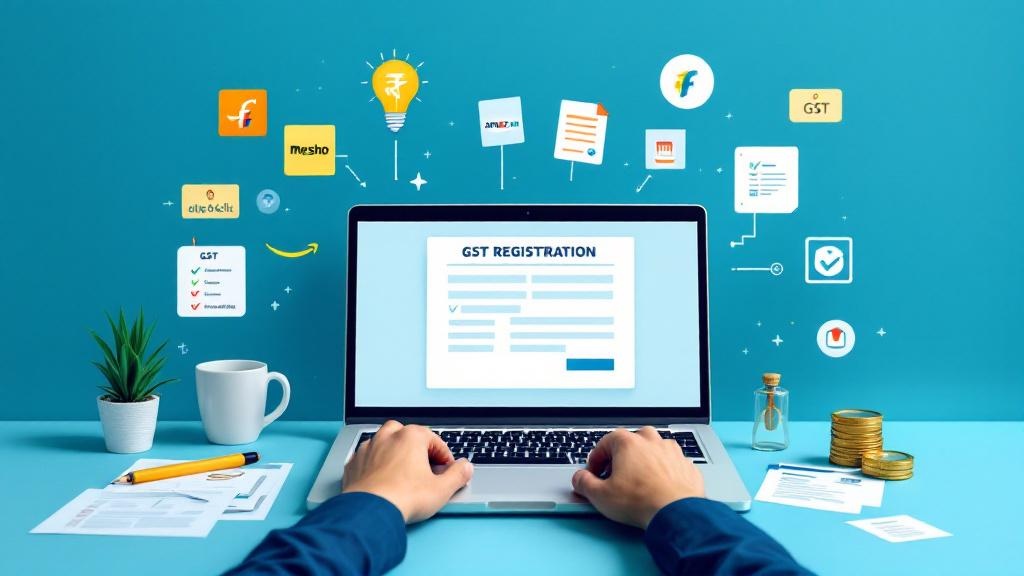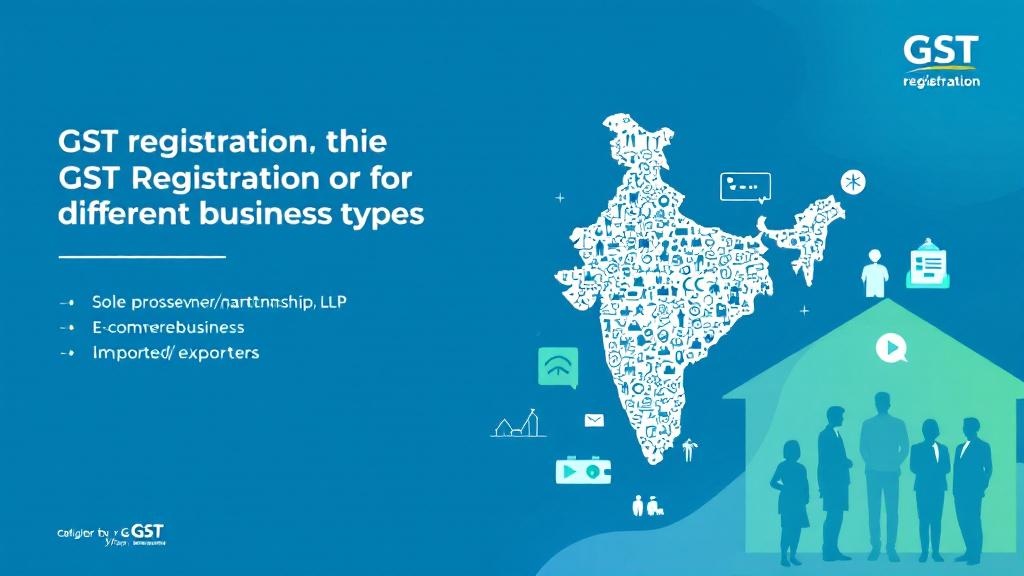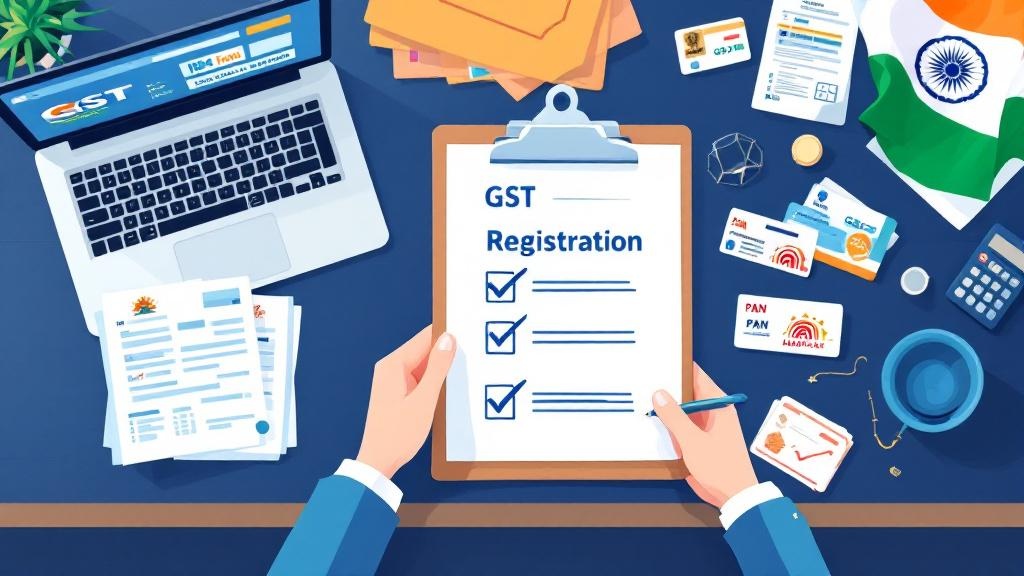In recent years, India’s economy has witnessed a significant growth in the number of Micro, Small, and Medium Enterprises (MSMEs). These businesses play a vital role in the country’s development by contributing to job creation, economic growth, and innovation. However, as MSMEs grow, managing taxes and compliance with government regulations can become increasingly complex. One of the crucial aspects of running a business in India is GST registration.
If you’re an MSME owner, it’s essential to understand when you need to register for GST, what the eligibility criteria are, and how the registration process works. In this article, we’ll break down everything you need to know about GST registration eligibility for MSMEs in India.
What is GST Registration?
Before diving into eligibility conditions, it’s important to understand what GST registration actually means.
GST (Goods and Services Tax) registration is a process where a business or entity is recognized by the government as a taxable entity. Once registered, businesses must comply with the provisions of the GST Act, including collecting and remitting GST on taxable goods and services. The GST system aims to streamline the tax structure, replacing various indirect taxes like VAT, service tax, excise duties, and others.
For MSMEs, GST registration can have several benefits, such as better business credibility, input tax credit claims, and the ability to expand operations across state borders without restrictions.
If you’re looking for more details about the GST registration process for MSMEs, Fintax24 can provide you with expert guidance and assistance.
Why Should MSMEs Consider GST Registration?
Before we look into the eligibility conditions, let’s briefly discuss why GST registration is important for MSMEs.
1. Tax Benefits & Input Tax Credit
One of the major advantages of GST registration is the ability to claim input tax credit (ITC). This means that businesses can reclaim the GST paid on purchases, reducing their tax burden and improving cash flow.
2. Increased Business Credibility
Registered businesses are considered more reliable in the eyes of clients, suppliers, and stakeholders. For MSMEs looking to build long-term relationships with large businesses or government entities, GST registration is often a mandatory requirement.
3. Interstate Trade
GST registration allows MSMEs to trade across state borders without facing issues related to interstate taxes or barriers. This opens up a larger market for your goods and services.
4. Simplified Tax Compliance
With the introduction of GST, businesses no longer need to worry about multiple taxes. The centralized system allows businesses to maintain a single record of transactions, simplifying accounting and compliance.
GST Registration Eligibility Criteria for MSMEs
1. Turnover Threshold Limits
The most important criterion for GST registration eligibility is the annual turnover of the business. Based on the turnover, businesses are categorized into different segments, which determine whether GST registration is mandatory or optional.
For Goods Suppliers:
-
Micro Enterprises: If the turnover is less than ₹40 lakhs annually, GST registration is optional.
-
Small Enterprises: If the turnover is between ₹40 lakhs and ₹1.5 crore, GST registration is mandatory.
-
Medium Enterprises: If the turnover exceeds ₹1.5 crore, GST registration is compulsory.
For Service Providers:
-
Micro Enterprises: If the turnover is less than ₹20 lakhs annually, GST registration is optional.
-
Small Enterprises: If the turnover is between ₹20 lakhs and ₹50 lakhs, GST registration is mandatory.
-
Medium Enterprises: If the turnover exceeds ₹50 lakhs, GST registration is mandatory.
Special Categories:
Some businesses, such as those involved in the sale of specific goods or services, may have different thresholds. For instance, businesses dealing in pan masala, tobacco, or opium will have different turnover limits for GST registration.
2. Interstate Supply of Goods or Services
If your MSME engages in the supply of goods or services across state borders, GST registration is mandatory, regardless of turnover. This ensures that the business is compliant with interstate tax rules, allowing you to collect and pay the applicable taxes.
3. Online Sale of Goods and Services (E-commerce Sellers)
Businesses operating on e-commerce platforms, such as Amazon, Flipkart, or other online marketplaces, are required to register for GST if their annual turnover exceeds the prescribed limit. Even if your business doesn’t exceed the turnover threshold for GST registration, the e-commerce platform may mandate GST registration for listing your products.
4. Voluntary GST Registration
Even if your MSME doesn’t meet the turnover requirements for mandatory registration, you may choose to voluntarily register for GST. Voluntary registration can help you claim input tax credit on your purchases, expand your market reach, and improve your business’s credibility. It’s also a good choice if you’re expecting your business turnover to cross the threshold in the future.
5. Other Conditions for GST Registration
Certain businesses and individuals are required to register for GST, regardless of their turnover. These include:
-
Casual Taxable Persons: Individuals or entities that occasionally supply goods or services and do not have a fixed place of business.
-
Non-resident Taxable Persons: Foreign businesses that supply goods or services in India are required to register for GST.
-
Taxable Persons Who Supply Goods or Services through E-commerce: Even if the business is not required to register based on turnover, those supplying goods via e-commerce platforms like Amazon or Flipkart must do so.
Exemptions from GST Registration for MSMEs
While most MSMEs are required to register for GST if they meet the necessary criteria, certain exemptions apply under specific conditions:
-
Small Service Providers: If the service provider’s turnover does not exceed ₹20 lakh (₹10 lakh for special category states like Jammu & Kashmir, Himachal Pradesh, etc.), they are not required to register for GST.
-
Agricultural Activities: If your business is involved in agricultural activities (such as farming, dairy, or floriculture), GST registration is not required.
-
Small-Scale Retailers: Retail businesses with low turnover may not need to register if they meet specific conditions under the exemption clauses.
How to Apply for GST Registration?
Once you’ve determined that your MSME is eligible for GST registration, the next step is to complete the application process. Here’s a brief overview:
-
Online Application: You can apply for GST registration through the official GST portal (www.gst.gov.in).
-
Documents Required:
-
PAN card of the business
-
Proof of business address
-
Bank account details
-
Aadhar card of the business owner
-
-
GST Application Form (GST REG-01): Complete the form with all the necessary details and submit the documents.
-
GST ARN (Application Reference Number): After submitting the application, you’ll receive an ARN, which can be used to track your application status.
Once your application is processed and verified, the GST department will issue a GSTIN (Goods and Services Tax Identification Number), and you will be officially registered under GST.
Conclusion
Understanding the GST registration eligibility conditions for MSMEs is essential to ensure compliance and take full advantage of the benefits the GST system offers. While the process may seem complicated at first, it’s relatively straightforward once you know the necessary steps and conditions. By staying up to date with GST regulations, you can keep your business in good standing with tax authorities and avoid penalties.
If you’re still uncertain about your eligibility or need assistance with the registration process, services like Fintax24 can help guide you through the process and ensure that your MSME is fully compliant with GST regulations.
Remember, GST registration isn’t just about compliance; it’s also an opportunity to streamline your tax processes, increase your market reach, and boost your credibility in the business world.







Comments (0)